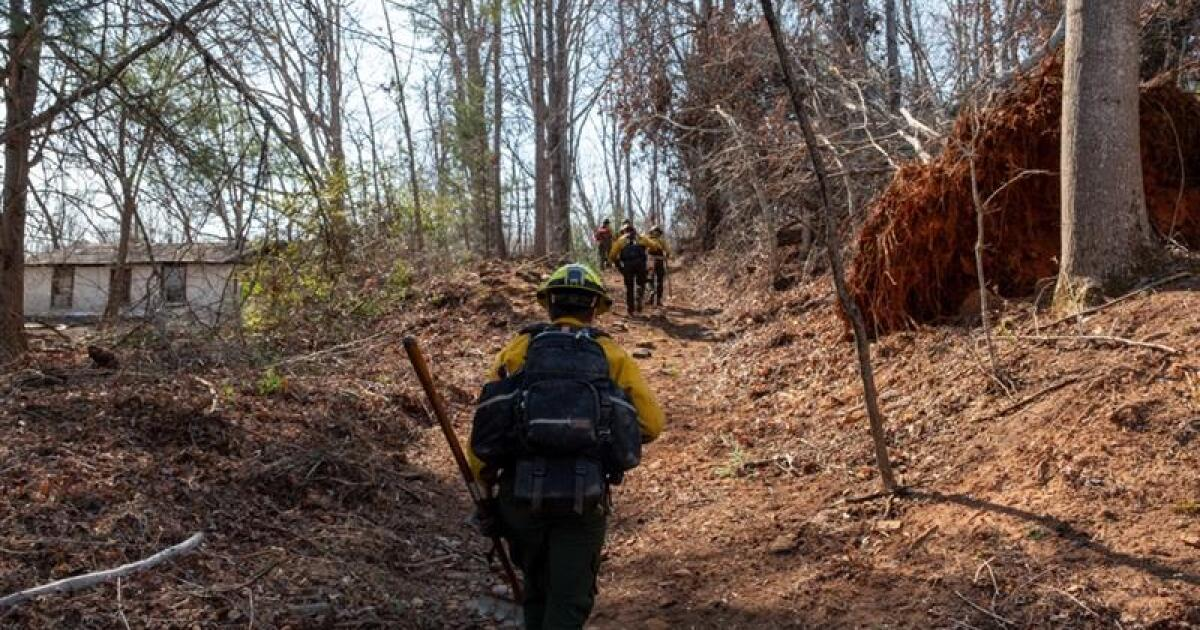Six months ago – following days of record-breaking rain – Hurricane Helene devastated Western North Carolina, reshaping the landscape and the lives of people here forever.
Now — amid grief and struggles to navigate the bureaucracy of government aid after the deadliest and costliest storm to ever hit the state — hundreds are having to evacuate again, this time from wildfires.
“We went through a lot with Hurricane Helene, so it’s kinda like we’re back there again, but we’ll fight through it and see what happens,” said Tim Merris who was pumping gas at the Cedar Mountain Outpost in Transylvania County.
Damage from the storm – including downed trees and washed out roads – make the fires harder to fight, along with high winds and dry weather conditions.
“Our crews are having to spend a lot of time cutting through downed trees with chainsaws just to get to where the fire is, to begin to establish containment lines,” NC Forest Service spokesperson E.J Dwigans said over the weekend.
“Our crews are spent by the time they even get into these fires. Some of the bridges and roads that we see on older maps are no longer available to us.”
The latest wildfire updates: Latest: Wildfires exceed 6,500 acres across the region; Fire officials to hold community meeting in Saluda on Thursday
Two of the biggest fires – Deep Woods and Black Cove – started last week along the Green River in Polk County. The fires have crept into Henderson County. The Table Rock Fire, which started last week in Pickens County, S.C., is inching north into Transylvania County.
In Swain County, a wildfire near the Alarka community was burning almost 1,000 acres as of Thursday morning. Other fires have started near Leicester, Franklin and in Haywood County.
Active evacuation orders for wildfires: List by county and community
In Polk County, fires are burning on both sides of the Green River Cove, where makeshift gravel roads had just been built after floods caused by Helene washed large sections of asphalt away.
 Two of the biggest fires in western North Carolina are burning on both sides of the Green River, which overflowed and damaged several areas in Polk County during Hurricane Helene.
Two of the biggest fires in western North Carolina are burning on both sides of the Green River, which overflowed and damaged several areas in Polk County during Hurricane Helene.
Those road conditions — a stark reminder of the storm’s damage — hamper firefighter access.
“ People are still trying to recover,” Polk County’s Emergency Management Director Bobby Arledge said. “This fire now though, on top of that, it’s just been a nightmare for those people who live in that area.”
Shelters: for wildfire evacuees in Western North Carolina
Dwigans has watched as the land that he spent countless hours fishing, hiking and foraging on turned black because of the fire.
“ Polk County has just seen disaster after disaster ever since Helene,” he told BPR reporters while touring some areas affected by the fire. “Not only have we had Helene damage, but we’ve had some very severe thunderstorms come through since then that have taken down more trees. Folks around here are a bit tired of the disasters.”
Lista: Refugios para evacuados por incendios forestales en el oeste de Carolina del Norte
In other parts of the state, Helene hit just as they recovered from other natural disasters. Alleghany County had only just recovered from the state’s second largest earthquake in 2020 when Helene swept through.
 Fire crews on the ground have been receiving air support from the US Parks Department who use chinook helicopters to dumps thousands of gallons of water on fires.
Fire crews on the ground have been receiving air support from the US Parks Department who use chinook helicopters to dumps thousands of gallons of water on fires.
“ It probably still is the worst thing that’s ever happened in Allegheny County,” Daniel Roten, president of the state emergency managers association, said of the earthquake.
“We were in the process of recovery from that, and it took us four years to get it done. We had just finished…maybe two months after I’d signed the last paperwork, Helene comes through.”
Gov. Josh Stein visited the Tryon International Equestrian Center where officials from Polk and Henderson counties, along with the Forest Service, have established a command center.
“I had money in my budget that I submitted to the General Assembly for funding to help us get ahead of these forest fires come the summer. They didn’t fully fund everything I’ve asked,” Stein told reporters.
“We’re gonna go back to the General Assembly with another package,” he said.” And fighting fires is gonna be a critical part of that because what we cannot have happen is the pain, the suffering that the people of Western North Carolina experienced from Hurricane Helene be compounded by a summer of fires.”
Lilly Knoepp, Laura Hackett and Katie Myers contributed to this report.

